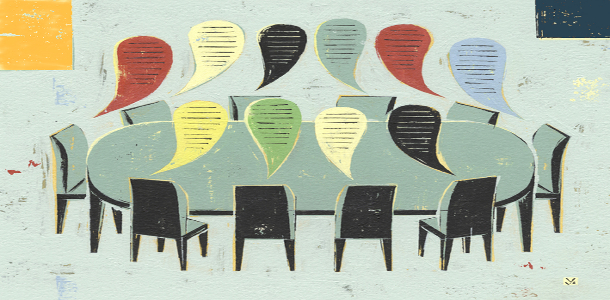




The dark history behind four common expr...
History is about more than just dates and places . . . it’s storytelling at its finest. While visiting Boston and the city’s historic sites this summer, I was captivated by the stories and storytellers I met there. Tied closely to the history of Plimouth, the Freedom Trail, and the Boston Tea Party is the language used to tell those stories. And as it turns out, the language has a history of its own. Many of our everyday idioms and expressions have dark origins that date back to colonial times. Think about the history of these terms the next time you use them. ...

Three essential (and surprising) podcast...
Looking for inspiration, but need inspiration about where to look? Try these podcasts. They may not be designed specifically for corporate communicators, but they do offer new ways to improve relationships and communication skills, understand psychology, solve problems and get past roadblocks with colleagues. “Where Should We Begin?” In this portal into raw emotion, psychology and problem solving, renowned couples therapist Esther Perel counsels real couples as they tell their stories. Discussions are unscripted and riveting. As described in The New Yorker: “The...

5 warning signs of a lazy writer
Writing isn’t easy. Whether it’s marketing, academic or technical copy, or you’re simply trying to think of what to scribble on a co-worker’s birthday card, writing can be arduous work — more so on some days than others. Communicators don’t want their results or standards to slip simply because they’re having an off day. Even when you feel profoundly unmotivated, avoid these five shoddy practices. 1. You don’t consider your audience. In corporate communications, “writing for your audience” often takes a back seat to the demands of executives or...

41 alternatives to the word “amazi...
If you pay attention, it’s appalling how many times you see the word “amazing.” It doesn’t seem to matter what’s being described — “amazing” is the go-to adjective. “You’ll have an amazing time.” “She’s an amazing leader.” “This amazing tool makes accounting fun!” If everything is amazing . . . then nothing is amazing. We’re all writers here, so let’s see if we can’t come up with a few alternatives to the word “amazing.” Here are a few to get started, though not all of these will apply in every...

Hyphen, en dash, or em dash?
As experienced writers and editors, many PR Daily readers harbor a dislike for the hyphen. It’s a punctuation mark that’s supposed to help writers avoid ambiguity, but it can confuse readers. Add dashes of varying lengths, and it’s chaos. Chaos aside, hyphens and dashes have different uses and cannot be used interchangeably. Here’s how to tell the difference and use each correctly. Hyphens Hyphens connect words, prefixes and suffixes, and they are generally used to avoid ambiguity. We found ourselves in a dirty movie theater. We found ourselves in a dirty-movie...

29 inspirational subject lines
Spam folders can be a treasure trove. The treasure? Marketing inspiration. Of course . . . some subject lines are horrible. But, others have potential, and can be adapted and improved. And considering that readers decide whether to read or trash your email in less than a second, well-written subject lines are essential. Here are a few examples of inspirational email subject lines. See what you can do with these . . . Your organic presence Your inorganic presence Does the past still...













